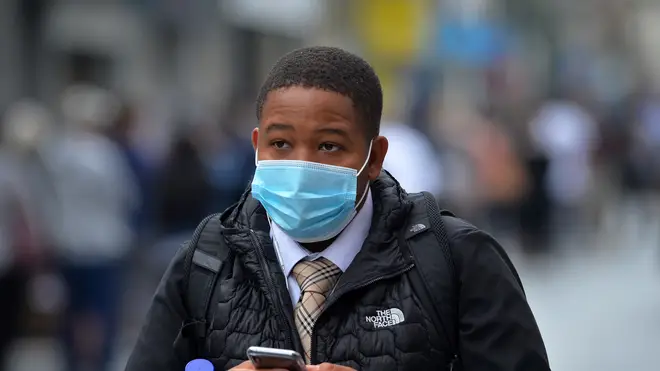
James O'Brien 10am - 1pm
12 November 2020, 11:31

Black and Asian individuals are up to two times more likely to contract Covid-19 than white people, comprehensive new research has warned.
The study also revealed that Asian people are twice as likely to be admitted to intensive care after testing positive for coronavirus than those from white ethnicities.
Black people have double the risk of catching the virus, while those of Asian ethnicities are 1.5 times more likely, according to analysis involving more than 18 million people in the UK and US.
Scientists involved in the research, which was published in the EClinical Medicine by The Lancet, said their findings should be of "importance to policymakers going forward".
They added that there are "many reasons" why people from these communities were more likely to contract the disease, including living in larger-sized households, having "lower socioeconomic status", or working in frontline roles.
Read more: BAME groups up to twice as likely to die with Covid, PHE report finds
Watch: Muslim and BAME communities not taking pandemic seriously - Tory MP

Govt reviewing why Covid-19 disproportionally affects BAME groups
Dr Jatinder Minhas, National Institute for Health Research (NIHR) academic clinical fellow at the University of Leicester, said the data suggested Asian people were also more likely to die from the virus than black or white individuals.
"In terms of (the risk of) death, it (the result) was very borderline," he added.
"But there was some signal to suggest that Asian individuals are at higher risk of death as compared to white individuals... This wasn't seen in those of black ethnicities."
However, the group said the decision to prioritise those from Black, Asian and Minority Ethnic (BAME) backgrounds for a Covid-19 vaccine will lie with the government and Joint Committee for Vaccination and Immunisation (JCVI), which advises ministers on all aspects of vaccination.
Read more: 'Decades of discrimination' led to BAME Covid inequality - report
Watch: BAME children will 'fall behind' without intervention, warns Lord Woolley

Dr Bharat Pankhania on BAME people and Covid
Dr Manish Pareek, associate clinical professor in infectious diseases at the University of Leicester and a senior author on the paper, said: "We must remember that there are several high-risk populations - notwithstanding individuals who are elderly, who have underlying comorbidities (and) individuals in nursing homes.
"So the government and JCVI will need to make important and difficult discussions and decisions about how to allocate what will undoubtedly be limited vaccine at the outset.
"I don't think we're necessarily suggesting that individuals of ethnic minorities should be a priority group necessarily, but I think what we're saying is that there are several priority groups and the government needs to make those difficult decisions."
As part of the first-ever meta-analysis of the effect of ethnicity on clinical outcomes in patients with coronavirus, the researchers looked at 50 studies published between 1 December 2019 and 31 August 2020 in peer-reviewed journals or as pre-prints waiting for peer-review.

Johnson: Government is acting on BAME Covid-19 report
The group said "a higher degree of morbidities within these (Asian) populations" could be one of many factors why they were at higher risk of experiencing severe bouts of the virus.
However, the researchers acknowledged that all studies investigating intensive therapy unit (ITU) admissions included in the meta-analysis had not yet been peer-reviewed.
Dr Pareek added: "Our findings suggest that the disproportionate impact of Covid-19 on Black and Asian communities is mainly attributable to increased risk of infection in these communities.
"Many explanations exist as to why there may be an elevated level of Covid-19 infection in ethnic minority groups, including the greater likelihood of living in larger household sizes comprised of multiple generations; having lower socioeconomic status, which may increase the likelihood of living in overcrowded households; and being employed in frontline roles where working from home is not an option."
Listen & subscribe: Global Player | Apple Podcasts | Google Podcasts | Spotify